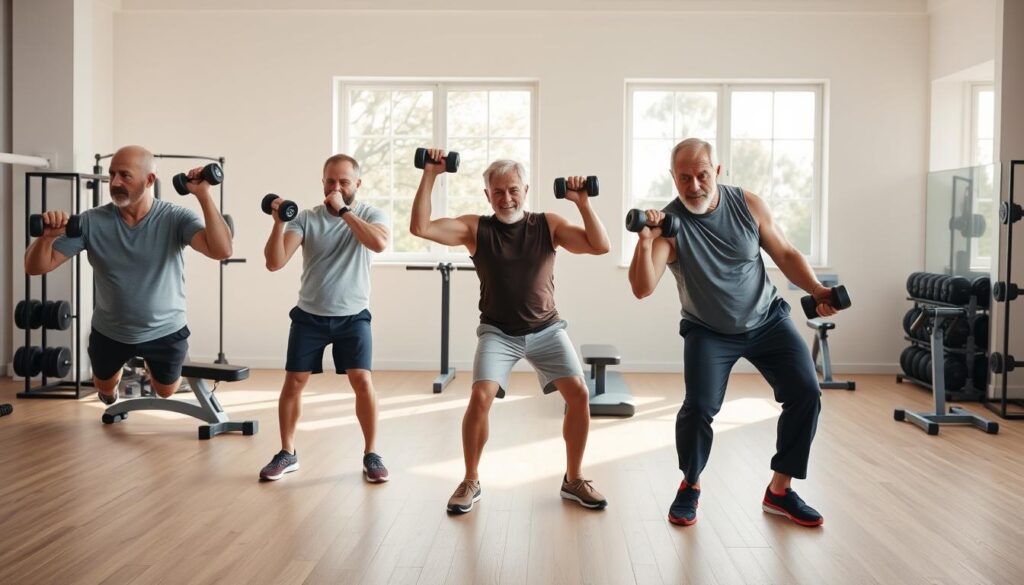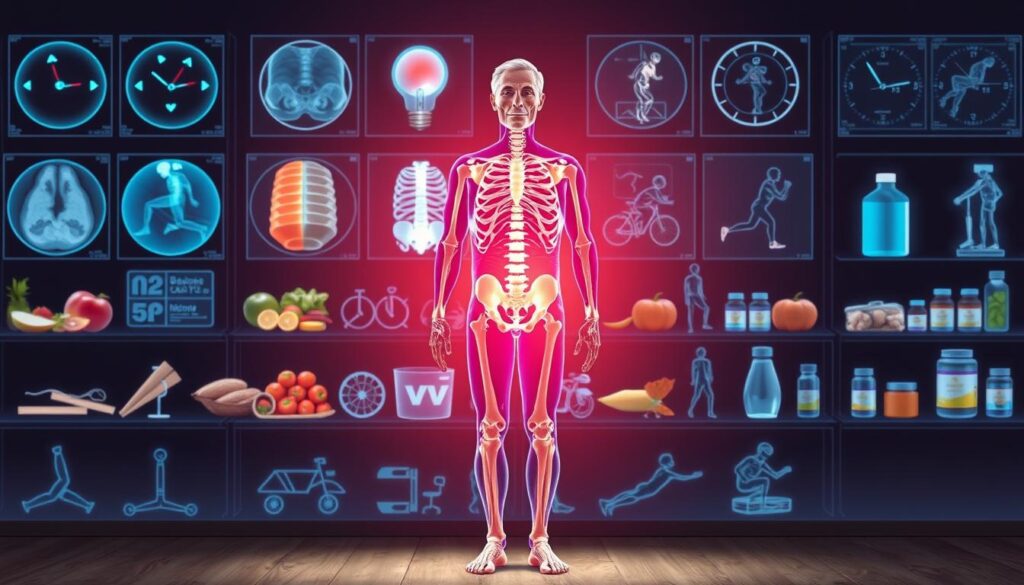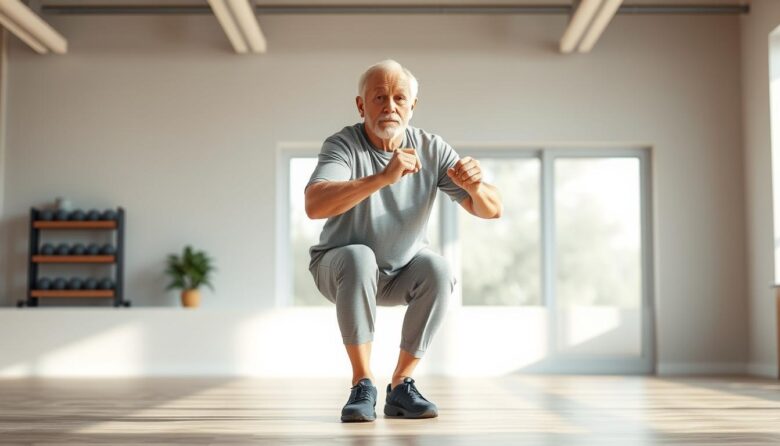As we get older, keeping our bones strong is key to avoiding osteoporosis and fractures. The National Institute of Arthritis and Musculoskeletal and Skin Diseases says many older adults face these issues. We think men can take steps to stay healthy and lower their risk of osteoporosis.
Begin your path to better health with Dr. John Spencer Ellis on Diet Guru. By focusing on osteoporosis prevention and managing your bone density, you can greatly enhance your life quality.
Key Takeaways
- Understand the risks of osteoporosis and low bone mass.
- Learn how to maintain strong bones as you age.
- Discover proactive steps to optimize your overall well-being.
The Silent Crisis: Why Bone Health Matters for Men
Bone health is a silent crisis affecting men worldwide. It has serious consequences if ignored. While osteoporosis is often linked to women, men are also at risk, facing severe impacts.
Common Misconceptions About Male Bone Health
Many men think osteoporosis is a women’s disease. This leads them to ignore their own bone health. Yet, about 10% of American men over 50 have osteoporosis, as the National Institute of Arthritis and Musculoskeletal and Skin Diseases reports.
Why Men Often Overlook Bone Health
Men often put other health concerns first, thinking osteoporosis isn’t a big deal for them. But, bone density loss can lead to serious health issues, like fractures and mobility problems.
The Truth About Male Vulnerability to Bone Loss
Men are not immune to bone loss; they are at risk, especially as they age. Lifestyle, diet, and genetics are key factors in bone health.
The Real Statistics on Male Osteoporosis
Osteoporosis is a big concern for men. 1 in 5 men over 50 will experience an osteoporotic fracture in their lifetime.
Current Prevalence Among American Men
Osteoporosis affects a lot of American men. About 2 million men have osteoporosis, and many more are at risk.
Mortality and Morbidity After Hip Fractures in Men
Hip fractures are a serious issue for men with osteoporosis. Men face higher risks of death and illness after such injuries. Effective prevention and treatment strategies are crucial to reduce these risks.
Understanding Age-Related Bone Changes in Men
As men get older, their bones face unique challenges. The right knowledge and interventions can help. Bone health is crucial for mobility and overall well-being.
How Male Bones Differ from Female Bones
Men and women both lose bone density with age, but differently. Men have larger bones and higher density, affecting their risk of osteoporosis and fractures. It’s important to understand these differences to support men’s bone strength.
The Timeline of Bone Density Loss in Men
Bone density loss in men happens at a slower rate than in women. Men reach their peak bone mass in their late 20s to early 30s. Then, bone loss starts. Factors like hormonal changes, lifestyle, and genetics can influence this process.
Hormonal Influences on Male Bone Health
Hormones are key to bone health in men. Testosterone supports bone density. As testosterone levels drop with age, bone health suffers. Understanding hormonal changes helps men support their bone health through calcium intake and nutrition.
Critical Age Periods for Intervention
There are critical age periods for bone health intervention. For men, around 50-60 years is a key time to assess bone health and prevent further loss. This can involve dietary changes, exercise, and medical screenings.
Risk Factors Specific to Men
Men face specific risks for bone health issues. Lifestyle factors like smoking and excessive alcohol, as well as medical conditions and certain medications, are risks. Knowing these risks helps men take steps to protect their bone health.
| Risk Factor | Impact on Bone Health |
|---|---|
| Smoking | Reduces bone density, increases fracture risk |
| Excessive Alcohol | Interferes with calcium balance, weakens bones |
| Certain Medications | Can accelerate bone loss, increase osteoporosis risk |
Essential Bone Health Tips for Men Over 50
Maintaining bone health is key for men over 50. It needs the right daily habits and knowing warning signs. As we age, our bones change, affecting their density and strength. But, with simple strategies, men can lower osteoporosis and fracture risks.
Daily Habits That Support Bone Strength
Changing daily routines can greatly impact bone health. By adding certain habits to your morning and evening, you can boost bone strength and overall health.
Morning Routine Adjustments
Starting the day with a bone-friendly routine is important. Eat a calcium-rich breakfast, like fortified cereal or Greek yogurt with nuts. Also, do some weight-bearing exercise, like walking or jogging. Exposure to natural sunlight in the morning boosts vitamin D levels, vital for bones.
Evening Practices for Bone Regeneration
In the evening, focus on relaxation and rest to help bones regenerate. Try yoga or light stretching to keep flexibility and reduce muscle tension. Also, eat magnesium and vitamin K-rich foods for dinner or a snack to support bone health at night.
Warning Signs You Shouldn’t Ignore
Knowing the signs of bone loss is crucial. Recognizing symptoms and when to see a doctor are key to keeping bones healthy.
Physical Symptoms of Bone Loss
Look out for back pain, loss of height, or a stooped posture. Also, watch for decreased mobility or an increased risk of fractures.
When to Consult a Specialist
If you notice unusual symptoms or have bone health concerns, see a healthcare specialist. They can check your bone health, suggest tests like a DEXA scan, and offer tailored advice for strong bones.
By following these daily habits and being aware of warning signs, men over 50 can actively work on their bone health. This helps prevent osteoporosis and fractures.
The Calcium Connection: Optimal Intake Guidelines
As men get older, keeping their bones strong is key. Calcium is a big part of this. The National Institutes of Health say men up to 70 should get 1,000 mg of calcium daily. For those over 70, it’s 1,200 mg.
Best Calcium Sources for Men
Men can get calcium from many foods. Eating a diet full of calcium is best for bone health.
Dairy and Non-Dairy Food Options
Dairy like milk, cheese, and yogurt are great for calcium. If you can’t do dairy, try fortified plant milk, kale, broccoli, and almonds.
Calcium-Rich Recipes for Men
Adding calcium to meals is easy and tasty. Try a kale and cheese omelette, Greek yogurt with almonds, or a smoothie with fortified milk and spinach.
Calcium Supplements: When and How to Take Them
Some men need calcium supplements to get enough. Knowing about different supplements and how to use them is important.
Types of Calcium Supplements
There are many calcium supplements, like calcium carbonate and calcium citrate. Calcium carbonate is cheaper but might upset your stomach. Calcium citrate is easier on the stomach but costs more.
Proper Timing and Dosage
When and how much calcium you take matters. Take supplements with meals to help your body absorb them better. Talk to your doctor to find the right amount for you.
Beyond Calcium: Other Critical Nutrients for Bone Health
Many nutrients are key for strong bones in aging men. Eating a balanced diet with these nutrients helps keep bones strong. It also lowers the chance of osteoporosis.
Vitamin D: The Sunshine Vitamin
Vitamin D is vital for bones. It helps control calcium levels and makes bones stronger. You can get it from fatty fish, fortified dairy, and sunlight.
Natural Sources and Supplementation
Getting vitamin D from food and sun is good. But, some men might need supplements. Consult with a healthcare professional to find out what’s best for you.
Optimal Blood Levels for Men
It’s important to keep vitamin D levels right for bones. Studies show levels between 30-50 ng/mL are best for health.
Magnesium, Vitamin K, and Other Supporting Nutrients
Magnesium and vitamin K are also important for bones. Magnesium helps bones grow, and vitamin K helps with bone proteins.
Nutrients to Avoid for Optimal Bone Health
Some nutrients are not good for bones. Too much sodium, caffeine, and phosphorus can hurt bones. Knowing this helps keep bones healthy.
Knowing about these nutrients helps men keep their bones strong. Making smart food choices can lower osteoporosis risk.
Weight-Bearing Exercises That Strengthen Men’s Bones
As men get older, it’s key to add the right exercises to their routine. This helps keep bones strong. Weight-bearing exercises are especially good for boosting bone density and health.
Resistance Training for Maximum Bone Benefit
Resistance training is a great way to make bones stronger. It works by challenging muscles and bones, which helps them grow and get denser. This can include lifting weights, using resistance bands, or doing bodyweight exercises.
Specific Exercises for Upper Body Bone Density
For a stronger upper body, men can try:
- Push-ups to strengthen the arms, shoulders, and chest
- Dumbbell rows to target the back and arms
- Shoulder presses to improve shoulder and upper back strength
Lower Body Exercises for Hip and Spine Strength
For the lower body, try:
- Squats to strengthen the legs, hips, and lower back
- Lunges to target the legs, hips, and glutes
- Deadlifts to engage the entire lower body and back
Low-Impact Options for Men with Joint Issues
Men with joint problems can benefit from low-impact exercises. Swimming, cycling, or using an elliptical machine are good options. They help keep bones healthy without stressing the joints too much.
Creating a Bone-Friendly Exercise Routine
To make a good exercise plan, men should:
- Do at least 30 minutes of weight-bearing exercise per session
- Include both upper and lower body exercises
- Make workouts more challenging over time
Weekly Exercise Schedule Template
A weekly schedule could be:
- Monday: Upper body resistance training
- Tuesday: Lower body resistance training
- Wednesday: Rest or low-impact activity
- Thursday: Upper body resistance training
- Friday: Lower body resistance training
Progression and Adaptation Strategies
To keep improving, men should:
- Use more weight or resistance in exercises
- Change exercises to work different muscles
- Pay attention to their body and adjust as needed

Preventing Falls and Fractures: A Practical Guide
Aging men can take steps to prevent falls and fractures. Making simple changes in daily life can help. Focus on home safety, balance training, and knowing what to do in case of a fall. This can greatly reduce the risk of osteoporosis-related injuries.
Home Safety Modifications for Aging Men
Simple home changes can lower fall risks. We recommend:
- Removing tripping hazards like loose rugs and electrical cords
- Improving lighting, especially in stairways and hallways
- Installing handrails in places like bathrooms and stairways
- Using non-slip mats in showers and bathtubs
These changes can make your home safer.
Balance Training Exercises
Balance training is key to preventing falls. Try these exercises:
- Single-leg stands to improve balance and stability
- Heel-to-toe walks to enhance coordination
- Tai Chi or other balance-focused exercises
These exercises can fit any fitness level. You can do them at home or with a group.
What to Do If You Fall: Immediate Steps
If you fall, knowing how to respond is crucial. We suggest:
- Remaining calm and assessing the situation
- Checking for injuries before attempting to stand
- Seeking assistance if needed, such as calling for emergency help
- Documenting the incident to identify potential causes and prevention strategies
Being prepared can help minimize the impact of a fall. It also helps prevent future incidents.
| Prevention Strategy | Description | Benefit |
|---|---|---|
| Home Safety Modifications | Remove tripping hazards, improve lighting, install handrails | Reduces fall risk |
| Balance Training | Single-leg stands, heel-to-toe walks, Tai Chi | Improves balance and stability |
| Fall Response | Stay calm, assess injuries, seek help if needed | Minimizes fall impact |
Lifestyle Factors Affecting Male Bone Density
As men get older, their lifestyle choices greatly affect their bone density. Smoking, drinking too much alcohol, stress, and poor sleep can all hurt bone health.
The Impact of Smoking and Alcohol: The Effects on Bone Health
Smoking and drinking too much alcohol are bad for men’s bones. Smoking makes it hard for the body to absorb calcium. Alcohol messes with hormones needed for strong bones. Men should drink less and quit smoking to keep their bones strong.
A study found that smoking can greatly lower bone density, raising the risk of osteoporosis. Drinking too much alcohol also increases the chance of breaking bones.
| Lifestyle Factor | Impact on Bone Health |
|---|---|
| Smoking | Reduces bone density, increases risk of osteoporosis |
| Excessive Alcohol Consumption | Disrupts hormone balance, increases risk of fractures |
Stress Management for Bone Preservation
Too much stress can harm bone health. Stress hormones like cortisol can stop the body from building and keeping bones strong.
Stress Hormones and Bone Loss Connection
The link between stress hormones and bone loss is complex. High cortisol levels can cause bones to break down. It’s key to manage stress well.
Effective Relaxation Techniques
Meditation, yoga, and deep breathing can lower stress. These practices help keep bones healthy. We suggest adding them to your daily routine to support bone strength.
Sleep Quality and Bone Regeneration
Good sleep is vital for bone repair. The body fixes and grows bone tissue while we sleep. So, it’s important to focus on getting quality sleep to prevent osteoporosis.
By controlling lifestyle factors like smoking, drinking, stress, and sleep, men can help keep their bones strong. This can prevent osteoporosis.
Medical Screenings and Treatment Options for Men
Men over 50 need to know about medical screenings and treatments for osteoporosis. Regular tests can find problems early and help keep bones healthy.
When to Get a DEXA Scan and Other Tests
Men over 50 should get a DEXA scan to check bone density. Blood tests for calcium and vitamin D are also important. These tests catch bone health problems early.
Medications and Therapies for Male Bone Health
Men with osteoporosis or at risk have many treatment options.
Prescription Options
Medicines like bisphosphonates can slow bone loss. Hormone therapy and bone-building drugs are also available.
Alternative and Complementary Approaches
Along with medicines, lifestyle changes and supplements can help bones. Talk to a doctor to find the right treatment for you.
| Treatment Option | Description | Benefit |
|---|---|---|
| DEXA Scan | Measures bone density | Assesses osteoporosis risk |
| Bisphosphonates | Slows bone loss | Reduces fracture risk |
| Lifestyle Modifications | Diet and exercise changes | Supports overall bone health |

Conclusion: Building a Lifelong Plan for Strong Bones
Keeping bones strong is key for men’s health, especially as they get older. Understanding bone health, knowing risks, and taking steps to keep bones strong can lower the chance of osteoporosis and fractures.
We’ve talked about important tips for bone health. These include eating right, doing exercises that make bones stronger, and making lifestyle changes like quitting smoking and managing stress. By adding these habits to your daily routine, you can lay a strong foundation for bone health for life.
Starting your health journey is simpler than you might think. A mix of diet, exercise, and lifestyle changes can lead to better bone health. By following the advice in this article, men can begin their path to a healthier, stronger life.
Creating a lifelong plan for bone health requires a broad approach. Making smart choices about what you eat, exercise, and your lifestyle can help keep bones strong and overall health good. We urge men to take charge of their bone health and embark on a journey to a healthier future.











Leave a Reply